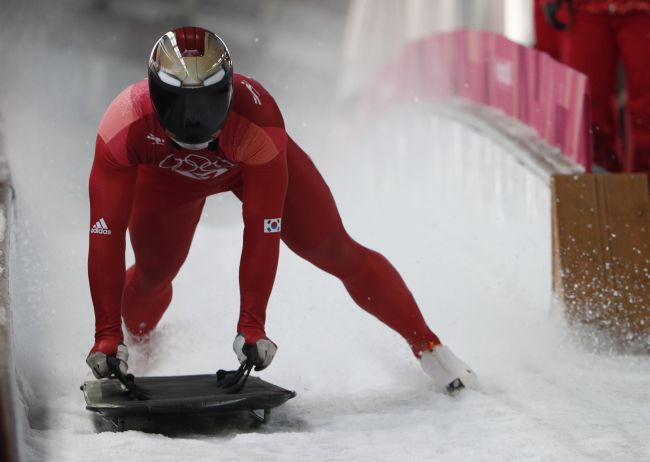 |
Yun Sung-bin of South Korea arrives at the finish area at Olympic sliding Center in PyeongChang, Gangwon Province, Friday. (Yonhap) |
On his way to the historic gold medal, Yun set the track record at Olympic Sliding Centre in PyeongChang, some 180 kilometers east of Seoul, three times. He clocked 50.28 in his first heat on Thursday, which was 0.36 second faster than the previous record held by Martins Dukurs. But he surpassed his own record later by marking 50.07 in his second run.
In the third heat, Yun had a time of 50.18, but in his final race, he clocked a track record of 50.02 to become the fastest slider among the 30 competitors.
For nearly 10 years, the men's skeleton world was dominated by Martins Dukurs of Latvia. Though he didn't have an Olympic gold medal -- only two silvers before coming to PyeongChang -- Dukurs was the overall IBSF World Cup title holder from the 2009-10 season to the 2016-17 season, with 50 World Cup victories.
Dukurs, also a five-time world champion, finished fourth at the PyeongChang Olympics with a combined time of 3:22.31.
Yun started to crack Dukurs' reign in the 2015-16 season, which he collected his first World Cup gold in St. Moritz, Switzerland, and stopped the Latvian from having a perfect season.
Still for the past two seasons, Yun came up short to get past Dukurs, finishing second in the World Championships and IBSF rankings. He did, however, emerge as one of the top candidates to dethrone Dukurs.
This season, Yun finally showed he is no longer just a strong contender as he collected five victories and two runner-up finishes in seven IBSF World Cups and topped the IBSF rankings. He skipped the season's eighth and last World Cup in Konigssee, Germany, last month, but the overall World Cup title was in his hands.
Dukurs only had two gold and three silver in this World Cup season, ending the season as world No. 4.
Now with the overall World Cup title and the Olympic gold, Yun has made a statement that he will be the next king in the men's skeleton world. And he is only 23 years old.
What made Yun so successful against other competitors this season was his superb starts. In his 13 heats in seven World Cups -- which he won five and finished runner-up twice -- Yun had the best start in 10 races, and even in the other three, he was second.
Yun's powerful starts continued at Olympic Sliding Centre. He had the quickest start in all four heats, even setting a start record on the track at 4.59 in his second run.
At the PyeongChang Olympics, notorious curves like the curve No. 2 and 9, which made German luge star Felix Loch surrender his Olympic title defense, were no problem for Yun. Skipping the final World Cup, Yun focused on his training on the Olympic track to better understand the turns and curves. He has reportedly raced nearly 400 times at Olympic Sliding Centre, probably the most among any other skeleton riders in the world, given that the Olympic track is in Yun's home country. His tough practices resulted in an easy wire-to-wire victory.
Critics of Yun can point out that his gold came from his home track advantage of having more practices with familiar surroundings. Yun's task for the upcoming seasons will be proving his Olympic gold medal was not a one-time fluke.
But even if Yun faces a slump going forward, his name will be written in the history books of winter sports.
Yun is now the first Asian to win a medal in the Olympic skeleton competition. He is also the first South Korean Winter Olympic medalist from non-skating sports.
Since South Korea first appeared at the Winter Olympic Games in 1948, all 55 of its medals, including the medals won at the PyeongChang Winter Olympics, had come from skating sports, with 42 of them earned by short trackers. But Yun has now opened a new era with his historic gold at home. Coincidently, his gold came on Lunar New Year's Day, and this could be Day One of his era. (Yonhap)




![[Exclusive] Hyundai Mobis eyes closer ties with BYD](http://res.heraldm.com/phpwas/restmb_idxmake.php?idx=644&simg=/content/image/2024/11/25/20241125050044_0.jpg)

![[Herald Review] 'Gangnam B-Side' combines social realism with masterful suspense, performance](http://res.heraldm.com/phpwas/restmb_idxmake.php?idx=644&simg=/content/image/2024/11/25/20241125050072_0.jpg)
